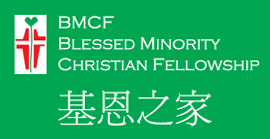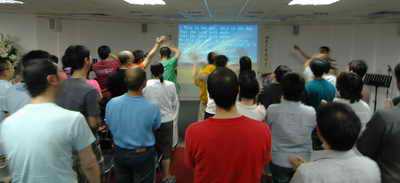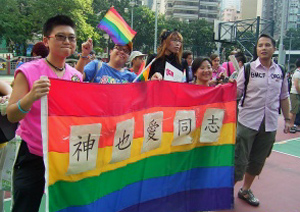By many in the LGBT community, Christianity is often perceived only as one of the most hostile forces that, historically, have been the fount of oppression of people of diverse sexual expression and which, in many of its current manifestations, is an impediment to their path to liberation and the full acquisition of their human rights. Given the strident hate of many Christian fundamentalists and the doctrinal positions of denominations like the Roman Catholic Church, it is scarcely surprising that amongst many LGBT activists one can find active antipathy towards the Christian faith. Nor is it surprising that there is a perception very common in the tongzhi community in Hong Kong that what faces it across the social barricades is a faith-based opposition. Yet this black and white binary vision falls short of the full picture, for it ignores the fact that many people of diverse sexuality and gender expression have always provided a great number of the most spiritual members of the human race; across ages and cultures the ranks of shaman and priest have included a disproportionate number of those whose gender and sexualities have differed from those of the majority. It also ignores the fact that, for many tongzhi, faith provides an important source of comfort, refuge and fellowship available in an otherwise very cold and indifferent world. Indeed, the oppression and the unique experience of the LGBT community makes faith more relevant to them than any other people.

The simplistic picture I have painted of unrelieved mutual antagonism also ignores a Church in Hong Kong which has, for nearly twenty years now, ministered to the LGBT community. This is the Blessed Minority Christian Fellowship, referred to in short as BMCF. I went along to one of their Sunday services recently to experience for myself what they offer. I should state at the outset, to confirm the suspicions of any atheist readers who have read this far, that I am a Christian myself, an Anglican of a very liberal tradition who attends one of the small number of Hong Kong churches belonging to the Anglican and Methodist communions that welcome tongzhi to their congregations. So before my visit to BMCF my sympathies already lay very much with a Church which, as they put it in their leaflet, welcomes ‘those most marginalised by church and society’. I was unprepared, however, for the great warmth of the welcome I was given and for what I can only describe as an immersion in the loving fellowship that permeates everything BMCF does. I was, to put it bluntly, bowled over by the experience.

I talked before the service with Kevin, a local Chinese, who is one of the most prominent figures in BMCF and handles much of its relations with the outside world, and with Paul Lucas, a Caucasian, who is one of the Church’s organists and the current head of the worship and liturgy department. They explain to me that BMCF was born in 1992, when it first emerged as a faith-based group within Hong Kong’s Ten Percent Club, one of the few LGBT community organisations active back then.
“Word quickly spread throughout the community,” Kevin says, “and in 1993, we formed our own fellowship. We used to go to accepting churches for our worship, but we slowly grew beyond that. We registered as BMCF in 1995 and two years later hired a venue for our own services for the first time.” This was followed in 2003 by the installation of Selina Sun, who was ordained in 2004 by a collegium of sympathetic clergy acting together from across the denominational divides. Reverend Sun as she then became continued to serve the congregation for six years under which BMCF developed from a broadly fellowship format into a more structured church. The Reverend Silas Wong, who had left the Christian and Missionary Alliance Church over his views on the liberation of LGBT persons (which were inconsistent with the strict fundamentalist teachings of the denomination), was installed as Pastor of BMCF in January 2010.
I ask them about belief. Paul tells me: “We are a Church with an open and affirming message of love and acceptance for all of God’s creation reminding them to be fully who they are intended to be. We are actively reconciling liberation theologians wrestling with the issues of our day and our reality, while remaining orthodox in our Christian tradition, which we do not see to be incompatible with our faith.” In what, in my experience, is a unique crossing of denominational boundaries, the BMCF has an informal group of clergy and academics teaching in theological seminaries from all over Hong Kong who visit and minister: Roman Catholics, Anglicans, Methodists and more. When I visit, for instance, the sermon is preached by a Roman Catholic father. BMCF is also strongly supported by Hong Kong’s Anglican (Church of England) Cathedral, St. John’s, where they have been conducting baptisms since 2001 and the Hong Kong Christian Institute, a liberal body that works on issues of social justice in church and society. This has helped encourage the Church to grow so that it now has a congregation of about 180-200 active members, of whom some 80-90 attend services each Sunday. Ninety percent are Hong Kong-born Chinese, so almost everything is conducted in Cantonese, with simultaneous translation into Mandarin, English and sign language offered.
If I was to try to sum up my feeling about BMCF in one word, that word would be ‘fellowship.’ There is a very non-hierarchical feel to this Church, both in its organisation and services. What BMCF calls ‘Co-Workers’ (a deacons board or church council for those who are familiar with those terms) are elected annually from Church members. All twelve departments of the Church (such as music and liturgy, workshops, social outreach, Christian education – there’s an adult Sunday school – and finances) are run by volunteers. Members of the Church come from all walks of life in Hong Kong and from all age groups and classes; they include gay men, lesbians, bisexuals and the transgendered, some, too, with physical impairments such as deafness or blindness. This is a truly inclusive church.
There is a big emphasis on workshops, for which professionals from the Hong Kong clergy and social sciences are drafted in to help. This year, for example, they are running a programme on the development of queer theology in an Asian context (Paul points out to me that much queer theology is predicated on western LGBT mores and culture). Spiritual foundation classes are held pre-baptism, there are fellowships catering to couples in monogamous relationships and to the young (the 20 plus fellowship), there’s a recreation group and, very importantly, a “Recovery Group”, which seeks to undo some of the hurt and pain inflicted through the spiritual and religious abuse, often internalised through misinformation and biblical literalism, that many have suffered in the past.
It is fellowship that I find most striking in the service, too. It’s an informal and joyous occasion in which everyone there takes evident delight in sharing the hymns and prayers and in welcoming newcomers. Much of the service is led by volunteers. They have a communion service on the third Sunday of the month, and all the services include some basics: several readings from the Bible; the Apostles’ Creed; the choir sings; a sermon; and elements of a more contemporary worship style, including songs, projected onto a screen in both Chinese and English. One important item is the collection of donations; the BMCF supports itself, including paying its fulltime Pastor and the rent. After the services, everyone gathers for coffee, a chat and a meal. It is a thoroughly happy occasion.

'God loves gays' banner at Hong Kong's second annual gay pride parade,
Nov 1, 2009. Photos by Felix of Southeast Asia via othersheepexecsite.com
I ask Kevin and Paul about the opposition that BMCF faces in the religious world of Hong Kong. “We have never had any trouble here from other Christians”, Kevin answers.
“We operate largely free from direct attack. The Christian community in Hong Kong was largely indifferent to LGBT issues and people up till 2004, when the Government began to consider an anti-discrimination bill. That caused a reaction and many of the evangelical Churches spent a lot of money opposing legislation, sadly successfully. Some ministers spoke from their pulpits against the tongzhi community, and there was even one occasion when LGBT activists picketed a Church in Cheung Sha Wan where the pastor had spoken in an inflammatory way against gays and lesbians. He hasn’t done that since! But we’ve never been attacked directly. When I think of the more than twenty supportive preachers who come to preach every year, and the numerous Christian organisations which have supported us in the past, the idea that all Christians are against us is simply not true.” (Kevin is too young to remember, I should add myself, the evangelical Christian opposition to the decriminalisation of homosexuality in Hong Kong in the eighties and early nineties; this was at times intense, but not then successful).
“I think a lot of the more recent aggression and hostile rhetoric voiced out by the evangelical churches in Hong Kong is somewhat of a new phenomenon”, adds Paul, and has developed due to what has been injected by the evangelical churches in the States where religion has become a “heavily politicised matter.” America’s culture wars have a long reach.
Aside from this, of course, and underlying everything, is the continuing conservatism of Hong Kong society. “About 80 percent of our brothers and sisters are not out to their parents or families”, Kevin tells me. This makes membership and openness very sensitive issues and BMCF is deliberately discreet. The Church has an open web site and issues literature, both of which advertise contact email addresses and telephone numbers (see below for these contact details) and in addition operates a telephone helpline manned on Friday nights (between 8.30 and 11pm). It does, though, keep its location undisclosed to new members; these are met by volunteers at Sheung Wan’s Western market and brought to their first service.
“We are still sure we are right to maintain this semi-open policy”, says Kevin, “as we aim to provide comfort to some people who are very sensitive and maybe unsure of their identities.”
“Attending Church with us is often part of a person’s coming out process,” adds Paul, “not just socially, but in terms of embracing and integrating one’s spirituality and sexuality and learning to live that out in the broader LGBT community – yet another coming out process.”
I was met and brought to Church myself; how much better I thought that than my own parish church’s traditional welcome desk. Things, though, according to Kevin, are slowly easing even here and once they become members of the Church, many are increasingly open about themselves. Some of their members have marched in the last two Pride Parades in Hong Kong, holding banners declaring God’s love for people of all sexual orientations.
I was asked to come back, and I shall go, with great pleasure.
You can visit the BMCF’s website at: www.bmcf.org.hk and contact them direct at blessedminority@yahoo.com.hk or by phone (852) 2834 6601, where you’ll find an answering machine on which you can leave your details if you wish. The Friday helpline (manned 8.30 to 11pm) is also on 2834 6601. You can also write to the BMCF at PO Box 20516, Hennessy Road Post Office, Hong Kong.
